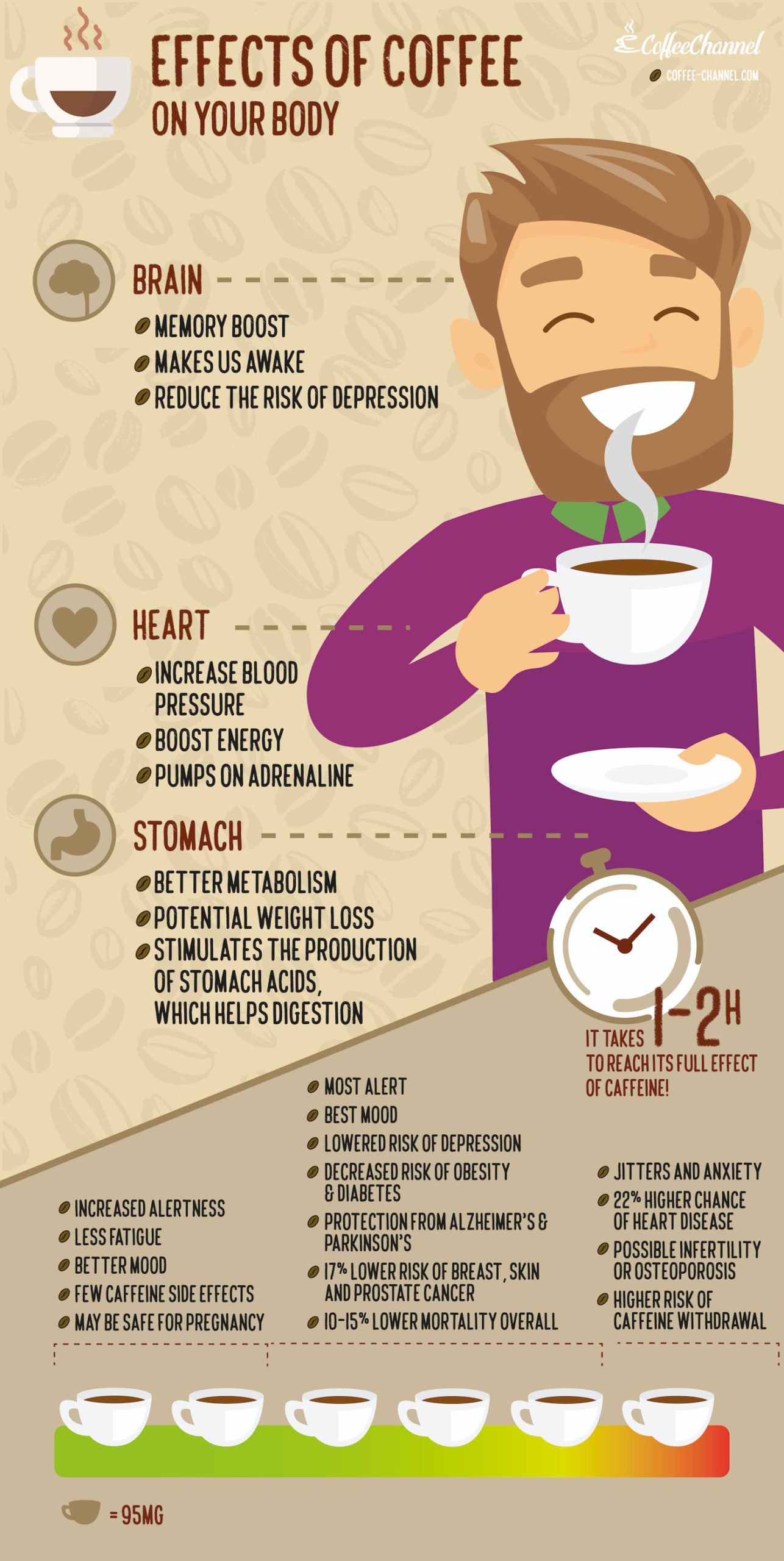
We all love that first (or third) cup of coffee in the morning, but have you ever wondered how coffee affects you? We have taken a close look at what coffee does in your body and put together this list of science-backed effects.
If you love coffee as much as we do, you will be thrilled to hear this. According to studies, coffee drinkers live longer than non-coffee drinkers! A recent Spanish study showed that people who drank four cups a day had an amazing 64% lower chance of dying. Keep reading to learn more about how coffee affects you.

What is Caffeine and How Does It Affect You?
Caffeine is a central nervous system stimulant. When you drink it, you feel less tired and more alert. It helps you focus and can decrease headaches and migraines. Because caffeine absorbs into your bloodstream through your stomach, it takes one to two hours to reach its full effect.
If you overdo it, caffeine can also give you negative symptoms like heartburn and nausea. That’s why researchers suggest you keep your caffeine consumption under 400 milligrams per day. The average cup of coffee contains 95 milligrams of caffeine, so you can safely consume about four cups of caffeinated coffee every day.
SEE ALSO: Amazing Coffee Statistics: All About Your Favorite Drink

How Much Coffee Do You Drink?
What effect will coffee have on your body? That depends on how much you drink. You’ll get a few benefits from drinking just a cup or two, but the optimal range, where you’ll get the most benefits and the fewest undesirable effects, is between three to five cups of coffee per day. Keep in mind that a cup of coffee is eight ounces, so if you’re drinking out of a bigger mug, you may need to do some simple math.
- Increased alertness
- Lowered drowsiness and fatigue
- Better mood
- No caffeine side effects like headaches or heartburn
- May be safe for pregnancy
- Most alert
- Best mood
- Lowered risk of depression
- Decreased risk of obesity
- Protection from Alzheimer’s, Parkinson’s, & diabetes
- 17% lower risk of breast, skin, and prostate cancer
- 10-15% lower mortality overall
- Jitters and anxiety
- 22% higher chance of heart disease
- Possible fertility or osteoporosis problems
- Higher chance of caffeine withdrawal
How does coffee do all this? The truth is, researchers aren’t completely sure. Many of the short-term effects can be attributed to caffeine, but some of the longer-term benefits, like lower mortality and chance of developing cancer, could be something called polyphenols. These are micronutrients found in plants that may have antioxidant properties.
Effects of Coffee on Your Body: The Bottom Line
So what’s the takeaway? Coffee is a stimulant that can make you more alert and focused, but the benefits go beyond that. If you stick to the sweet spot of three to five cups a day, you may experience positive effects like a better mood, plus a lower risk of health problems like obesity, depression, several kinds of cancer, and memory problems. You may even decrease your risk of dying!
You’ll probably want to stay under six cups of coffee, though -- after that, you may experience jitters, anxiety, caffeine withdrawal symptoms, and long-term issues like heart disease, infertility, and osteoporosis.
See Also:
- What are the health benefits of adding coconut oil to your coffee?
- The 40 Funniest Coffee Quotes
- Health Benefits of Drinking Coffee (According to Science)
- Which country drinks the most coffee?
Featured image credit: Africa Studio, Shutterstock














